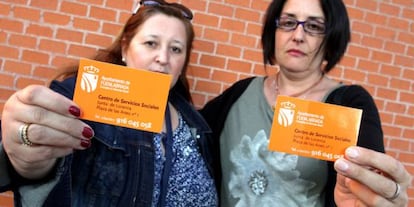Socialist candidate for Madrid mayor moots local ID card for non-residents
Carmona says proposal will give undocumented migrants access to social services

The Socialist mayoral candidate in Madrid has announced that, if he wins Sunday’s municipal elections, he will begin to issue a local identity card for migrants who do not hold residency papers. The document will allow them to tap into basic services, such as healthcare and public transportation and will even allow them to find a place to live.
During an interview with EL PAÍS on Tuesday, Antonio Miguel Carmona explained that his proposal is similar to one that has already been introduced in the Madrid satellite city of Fuenlabrada, as well as in New York City by Mayor Bill de Blasio.
The Fuenlabrada model
With a population of 210,000, the Madrid satellite town of Fuenlabrada began issuing a “social services card” two years ago to anyone, regardless of whether or not they had Spanish residency papers.
Since then, the city has handed out 10,253 cards to help families obtain basic services provided by the city.
“Each person meets with a social worker who takes charge to help them find what they need,” explained Mayor Manuel Robles of the Socialist Party.
Located south of Madrid, the city is divided into four sectors – based on the number of neighborhoods and districts – to help social workers attend to the many residents.
“If a person has an emergency, we will meet with them and inform them what they need to do without an appointment. Afterwards, we will offer them the necessary aid they require,” said Social Services councilor Carmen Bonilla.
“Those [without residency documents] can exercise their municipal rights and will be protected by City Hall, similar to what has been done in New York,” the candidate said.
“There is a risk that many don’t want this [measure], that they have no faith in it, but City Hall must protect and register these people so that they can claim their rights.”
Among the benefits the local identity card could give undocumented workers, the politician explained, are the right to tap into medical services, obtain city-funded housing and access public transportation.
Carmona’s plan is not included in the Madrid Socialist committee’s campaign platform framework, but party sources said that it has the federal panel’s backing because the proposal is in line with the Socialist Party philosophy that social services should be free to anyone who needs aid.
At the same time, the Socialists believe Carmona’s proposal also goes hand-in-hand with the various initiatives party members have presented in local and regional parliaments and in Congress to give undocumented migrants access to the public healthcare system.
In 2012, the Popular Party (PP) government prohibited migrants without residency papers from gaining access to free healthcare – a move that was harshly criticized by the Socialists and other leftist parties. The government did allow minors and pregnant women to access the system and migrants could still go to the hospital if they had an emergency.
Before, anyone could apply for a health card by just registering on the municipal rolls in their communities. But after the PP decision, many municipalities refused to even allow undocumented migrants from registering.
The government announced in March that it will backtrack on its 2012 decision.
Carmona’s proposal may help many non-resident migrants obtain an ID card and allow them access to basic services, but it may not guarantee they will get free medical care because the health systems are managed by regional governments.
But the Socialists continue to insist that everyone living within Spain’s borders should have the right to universal healthcare.
Tu suscripción se está usando en otro dispositivo
¿Quieres añadir otro usuario a tu suscripción?
Si continúas leyendo en este dispositivo, no se podrá leer en el otro.
FlechaTu suscripción se está usando en otro dispositivo y solo puedes acceder a EL PAÍS desde un dispositivo a la vez.
Si quieres compartir tu cuenta, cambia tu suscripción a la modalidad Premium, así podrás añadir otro usuario. Cada uno accederá con su propia cuenta de email, lo que os permitirá personalizar vuestra experiencia en EL PAÍS.
¿Tienes una suscripción de empresa? Accede aquí para contratar más cuentas.
En el caso de no saber quién está usando tu cuenta, te recomendamos cambiar tu contraseña aquí.
Si decides continuar compartiendo tu cuenta, este mensaje se mostrará en tu dispositivo y en el de la otra persona que está usando tu cuenta de forma indefinida, afectando a tu experiencia de lectura. Puedes consultar aquí los términos y condiciones de la suscripción digital.








































